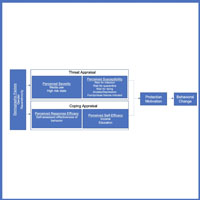Age differences in the relationship between threatening and coping mechanisms and preventive behaviors in the time of COVID-19 in the United States: Protection Motivation Theory

Submitted: August 8, 2020
Accepted: November 27, 2020
Published: January 14, 2021
Accepted: November 27, 2020
Abstract Views: 5662
PDF: 976
HTML: 29
HTML: 29
Publisher's note
All claims expressed in this article are solely those of the authors and do not necessarily represent those of their affiliated organizations, or those of the publisher, the editors and the reviewers. Any product that may be evaluated in this article or claim that may be made by its manufacturer is not guaranteed or endorsed by the publisher.
All claims expressed in this article are solely those of the authors and do not necessarily represent those of their affiliated organizations, or those of the publisher, the editors and the reviewers. Any product that may be evaluated in this article or claim that may be made by its manufacturer is not guaranteed or endorsed by the publisher.
Similar Articles
- Oliver Evers, Paul Schröder-Pfeifer, Heidi Möller, Svenja Taubner, How do personal and professional characteristics influence the development of psychotherapists in training: Results from a longitudinal study , Research in Psychotherapy: Psychopathology, Process and Outcome: Vol. 22 No. 3 (2019)
- Mario Fulcheri, Danilo Carrozzino, The clinical consequence of positive mental health in psychotherapy , Research in Psychotherapy: Psychopathology, Process and Outcome: Vol. 20 No. 2 (2017)
- Sara Silva, Isabel Basto, João Salgado, Carla Cunha, Validation of the client satisfaction questionnaire: a pilot psychometric analysis in Portuguese routine practice , Research in Psychotherapy: Psychopathology, Process and Outcome: Vol. 26 No. 2 (2023)
- Giorgio Gabriele Alberti, Anna Martorano, Bruno Martorano, The Competing Influences of Initial Depressive Symptomatology and Early Alliance on Early Outcome: A Preliminary Study , Research in Psychotherapy: Psychopathology, Process and Outcome: Vol. 16 No. 2 (2013)
- Franco Del Corno, Further reflections about the document: Psychotherapy for Anxiety and Depression: benefits and costs , Research in Psychotherapy: Psychopathology, Process and Outcome: Vol. 20 No. 2 (2017)
- Elena Faccio, Francesca Turco, Antonio Iudici, Self-writing as a tool for change: the effectiveness of a psychotherapy using diary , Research in Psychotherapy: Psychopathology, Process and Outcome: Vol. 22 No. 2 (2019)
- Ana Catarina Nunes da Silva, António Branco Vasco, Jeanne C. Watson, Alexithymia and therapeutic alliance: a multiple case study comparing good and poor outcome cases , Research in Psychotherapy: Psychopathology, Process and Outcome: Vol. 21 No. 2 (2018)
- Ester D'Onofrio, Cecilia Serena Pace, Donatella Cavanna, Qualitative research in adolescent psychotherapy: attachment and reflective functioning as psychotherapy’s outcomes of an adolescent with anorexia nervosa , Research in Psychotherapy: Psychopathology, Process and Outcome: Vol. 18 No. 2 (2015): Special issue on Qualitative and Quantitative Research in Child and Adolescent Psychotherapy: part 1
- Ana Marìa Luzzi, Daniela Bardi, Laura Ramos, Sara Slapak, A study of process in psychoanalytic psychotherapy with children: the development of a method , Research in Psychotherapy: Psychopathology, Process and Outcome: Vol. 18 No. 2 (2015): Special issue on Qualitative and Quantitative Research in Child and Adolescent Psychotherapy: part 1
- Diego Romaioli, Elena Faccio, When Therapists Do Not Know What to Do: Informal Types of Eclecticism in Psychotherapy , Research in Psychotherapy: Psychopathology, Process and Outcome: Vol. 15 No. 1 (2012)
<< < 13 14 15 16 17 18 19 20 21 22 > >>
You may also start an advanced similarity search for this article.

 https://doi.org/10.4081/ripppo.2020.485
https://doi.org/10.4081/ripppo.2020.485





